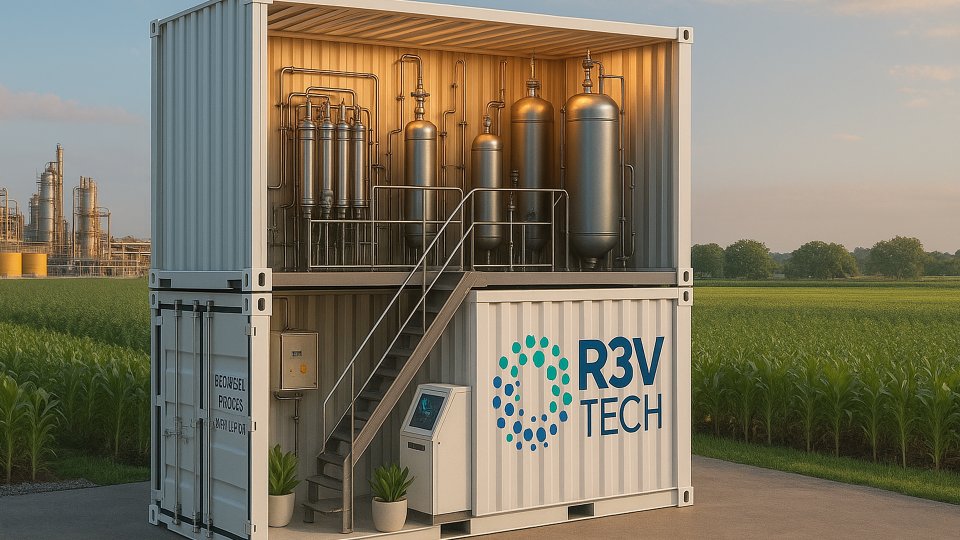The R3V Tech team, headed by chemistry experts Dr Adriano Randi (CEO) and Professor Benjamin Buckley (CSO), have developed a process that converts crude glycerol – a low-value by-product of the biodiesel industry – into a high-value bio-derived solvent that is commonly used in pharmaceutical, cosmetic and industrial sectors and as a fuel additive.
The company is currently scaling its laboratory-based process from gram-scale experiments to kilogram-per-hour production and has recently been awarded an Innovate UK grant to build and trial a pilot demonstrator at a biodiesel plant within the next five months.
“I saw this project as a big opportunity to work on something that can make a difference to the planet, the environment, and society,” said Dr Randi, CEO and co-founder of R3V Tech.
“I’d like to see every biodiesel company using this process one day – and to leave behind a legacy that helps the next generation.”
What currently happens to crude glycerol
Biodiesel, a renewable fuel made from plant oils, animal fats, and recycled cooking oils, offers a greener alternative to petroleum diesel as it is biodegradable, produces significantly lower greenhouse gas emissions when burned, and can be made from waste materials rather than crude oil (a non-renewable ‘fossil fuel’ resource).
However, for every tonne of biodiesel produced, around 100 kilograms of crude glycerol is generated.
Because it is contaminated with leftover chemicals and impurities from fuel production, crude glycerol is difficult to recycle. As a result, most biodiesel producers sell it cheaply to companies that refine it and often use the refined material to produce solketal – a bio-derived solvent and fuel additive with an estimated global market value of $78 billion.
Not only does this come at a cost to biodiesel producers, but it also comes at a cost to the planet, as it involves shipping crude glycerol – often overseas – which generates emissions, and current refining methods are highly energy-intensive, requiring high temperatures and pressures.
R3V Tech’s electrochemical process will enable biodiesel producers to convert crude glycerol directly into high-value solketal on site, eliminating refining costs, even at small scale, and allowing them to use it or sell it for profit.
It removes the need to transport the by-product to other facilities, reducing transport emissions, and the Loughborough team’s process operates at room temperature and atmospheric pressure, cutting both energy consumption and operational costs. The process also utilises waste carbon dioxide, further reducing the environmental impact of refining crude glycerol.
How R3V Tech’s process works
The conversion process begins by filtering crude glycerol and mixing it into a prepared solution, which is then saturated with carbon dioxide. This mixture is drawn through an electrochemical reactor, where electricity drives a chemical reaction that transforms the waste material into solketal, which is then collected in liquid form.
The R3V Tech company and process was developed through the EPSRC Impact Acceleration Account and the ICURe programme – an Innovate UK-funded initiative designed to accelerate the commercialisation of university research by supporting the creation of spin-out companies.
The team’s long-term goal is to deliver a self-contained, modular unit housing the electrochemical reactor and its supporting components – resulting in a plug-in system that allows biodiesel producers to easily start converting crude glycerol into solketal on site.
To enable rapid development to market, R3V Tech was selected in 2025 to be part of the Shell Start-Up Engine and the Royal Society of Chemistry Change Makers programme.

R3V Tech is scaling its electrochemical reactor and plans to develop a self-contained, modular unit housing the reactor and supporting components for commercial application. (AI-generated concept image).
“By integrating this new system, biodiesel producers can create a new revenue stream, reduce waste transport and processing emissions, and make their operations more sustainable”, said Dr Randi.
“R3V Tech’s motto is ‘Reduce, Reuse, Revalue’ and this captures the spirit of the innovation: empowering producers to refine their own by-products and boost profitability while contributing to a circular, low-carbon economy.”
Biodiesel companies and funders interested in working with R3V Tech, can email info@r3vtech.com.
Further information, can be found on the R3V Tech website: www.r3vtech.com
This article has been published as part of the PR Environment campaign. Further information on the campaign can be found in the launch press release.